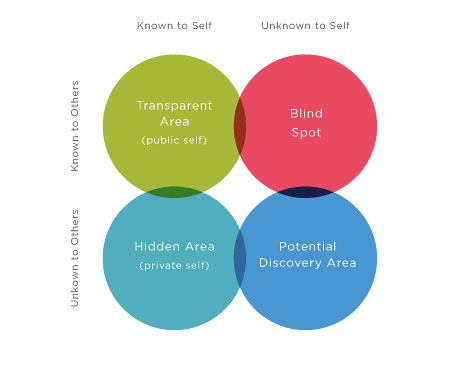The focus of The Game has been to support students to handle complex social challenges and learn more about how to create positive change in the world. But, as Annie Simpson and Mike Klassen revealed at the group’s final workshop, you can only go so far in creating social change if you are not actively developing your self-awareness. Daniel Goleman, emotional intelligence guru, conducted a ten-year study of 180 companies. His purpose was to understand which factors (technical skill, cognitive ability or emotional intelligence) were the strongest predictors of an organizations outstanding performance. He found that emotional intelligence is twice as important as technical or cognitive skills (for more information, see Centre for Creative Leadership White Papers).
So how do we go about developing our emotional intelligence and self-awareness? Two frameworks were shared: ‘Peeling Back the Onion’ from Bill George’s book True North: Discovering your Authentic Leadership, and the Johari Window. Like an onion, we all have many layers, and if you want to know yourself better, you need to become more aware of all of them. Are you aware of your body language, your leadership style, your values, your blindspots, your vulnerabilities and your strengths? Have you reflected on your life experience and thought about how you have been shaped by your family, by events, and by challenge?
To further help us get to know ourselves better, Annie and Mike led the group in an activity where everyone predicted which leadership archetype each person on their team is best represented. Using cue cards and an envelope, each team member submitted their predictions to each of their teammates.
When I opened up my envelope, I was surprised to see two distinct leadership energies appear: Gatherer and Warrior. Someone who designated me as Gatherer told me that when it comes to team meetings, I always try to include everyone so that they can have a say in important manners while building strong relationships with everyone in the team. A teammate that described me as a Warrior said, “everything you do seems to have a strong sense of purpose. You take things seriously and have a solid idea of what you want to do.”
In terms of my own self-awareness, I best associate myself with Gatherer, but not so much with Warrior. After reading every response I got, I started to realize that there are things that my teammates saw within me that I did not see in myself.
Self-awareness doesn’t just extend to what you know about yourself, it also pertains to what people see or think about you as well. It is important in every team situation to be aware of your own strengths and weaknesses, as well as those of your team. Sharing these with your team helps to strengthen trust between teammates, and also allows everyone to improve through the feedback process. In conclusion, it is always important to actively develop your self-awareness in order to create positive change for a better world.
-Kevin Saludares

